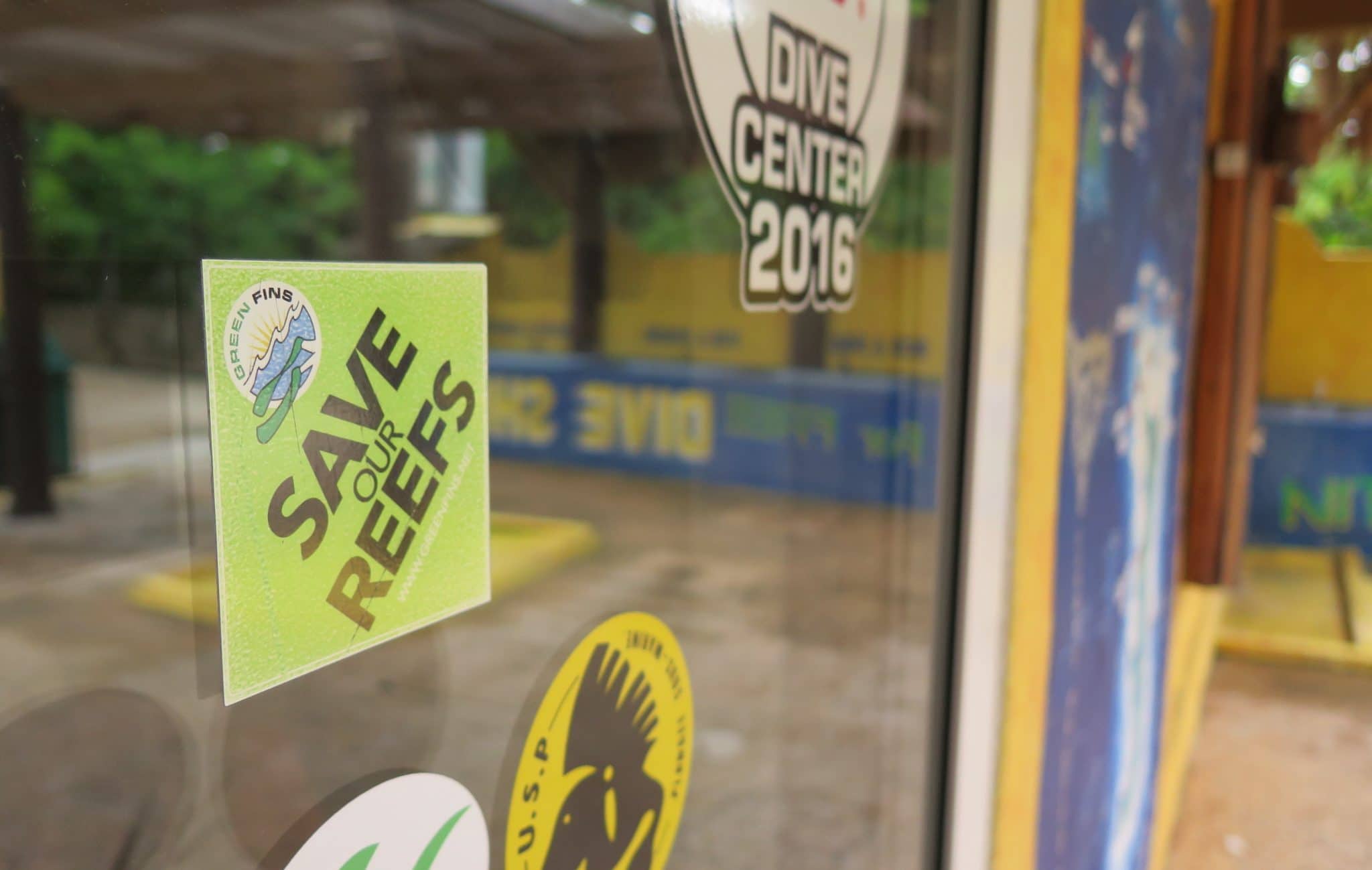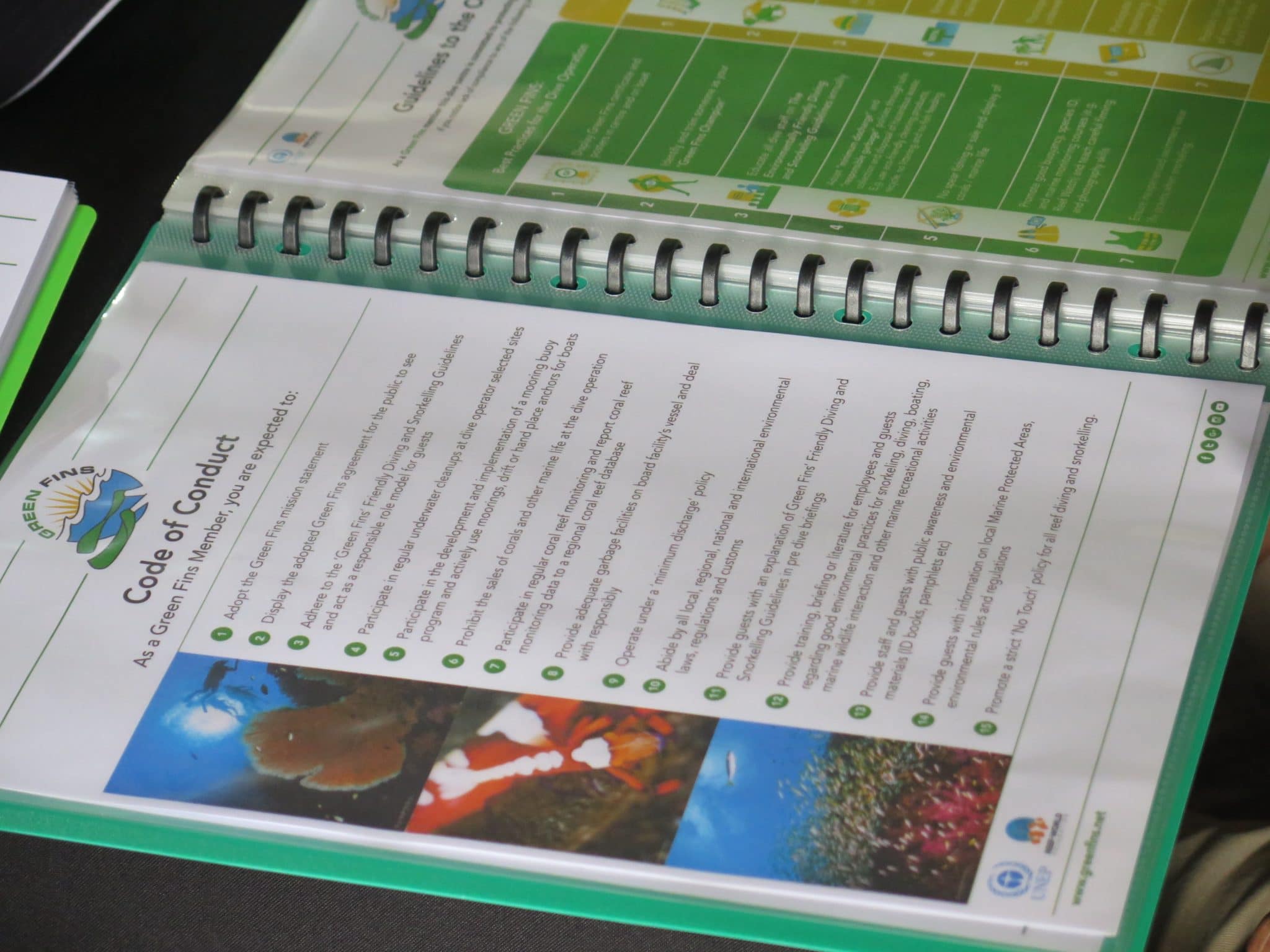Marine Life & Conservation
Reef-World Foundation and CDWS call for protection of Egypt’s coral reefs

Following the recent announcement of UK flight restrictions to Sharm el Sheikh being lifted, and the subsequent rush of operators to resume selling holidays to the region, The Reef-World Foundation and Chamber of Diving & Watersports (CDWS) are calling for tourists and operators to remember the actions they can take to protect the country’s precious coral reefs.
With UK flights to Sharm el Sheikh restarting, business from the UK to Egypt, which increased by 30% between 2017 and 2018, is now expected to rise even further. As a result of this expected influx of tourism to the region, Reef-World – the international coordinator of the UN Environment Programme’s Green Fins initiative – and CDWS – which implements the initiative in Egypt – are urging people to remember the importance of protecting the reefs they visit.

Chloe Harvey, Director at The Reef-World Foundation, said: “We’re proud to be working alongside CDWS helping protect Red Sea coral reefs through Green Fins – but we can’t do it alone. Everyone has a part to play, which is why we’re asking tourists to reduce their negative impact on coral reefs by following a few simple guidelines, as outlined by the Green Fins Code of Conduct. Reducing diving and snorkelling-related damage to coral reefs helps make them more resilient to other stressors such as those associated with climate change. If we all make an effort to act as a responsible tourist, we can protect Egypt’s beautiful coral reefs for many years to come.”
The Green Fins guidelines recommend that divers and snorkellers:
- Don’t step on coral: Divers and snorkellers can easily break coral with their feet or fins. This can cause injury and kill coral reefs
- Don’t touch or chase marine life: This can lead to stressed and scared animals that will swim away, leaving nothing for guests to see. Sharks species, in particular, should be left alone as our presence can influence and disrupt their natural behavior
- Don’t stir the sediment: Careless divers and swimmers who stir up the sand can cause damage and spread disease on reefs
- Do not buy souvenirs of shell, coral or other marine life: This encourages people to take marine life from the ocean, removing the beautiful creatures people have travelled so far to see
- Do not take marine life – dead or alive: Removing species that would normally break down and be recycled into the sea leaves other animals without nutrients and elements they need for growth. Even empty shells on the beach play an important role in the wider ecosystem. Take nothing but pictures, leave nothing but bubbles.
- Don’t litter: Throwing trash in the ocean kills marine life, poisons seafood and can cause injury – minimise your use of single-use plastics and recycle or dispose of your litter properly. You can also pick up any litter you see in the ocean or on the beach
- Don’t wear gloves: Gloves can encourage tourists to touch things underwater, which could cause fatal injury and damage marine life. In Egypt, the use of gloves is not permitted
- Don’t feed the fish: This can make fish sick or aggressive, especially with sharks, causing them to attack and injure humans. Fed fish are also more likely to leave their nests empty and vulnerable to predators
- Dispose of litter responsibly: Throwing trash in the ocean kills marine life, poisons seafood and can injure tourists. Encourage recycling and proper disposal
- Wear reef-safe sunscreen: Some chemical components in sunscreen – including Oxybenzone and Octinoxate – may have a negative impact on coral reefs. Help protect coral from harmful chemicals by using alternatives which are reef-safe and covering up with clothing when in strong sunshine.
- Report environmental violations: If you see any destructive practices or violations of environmental laws, tell your dive guide, dive operator or government officials. By informing key authorities, you are being part of the solution as your actions can lead to appropriate action.
- Participate in conservation projects: By taking part in conservation projects, you can have a positive effect on the environment and help educate others.

The Green Fins initiative aims to protect coral reefs through environmentally friendly guidelines that promote sustainable diving and snorkelling. The only internationally recognised environmental standards for the diving and snorkelling industry, it has a robust assessment system to measure compliance.
Green Fins was piloted in South Sinai Governorate in September and will be expanded to be available to all dive and snorkel operators nationwide by March 2020. Egyptian marine tourism operators who sign up to the programme are playing their part in protecting coral reefs from the negative impacts associated with diving and snorkelling. The CDWS is rallying more dive centres to join the Green Fins initiative to help improve their sustainability and prove they are following environmental best practice as a way of attracting eco-minded tourists. Interested operators in the region can sign up by contacting the Green Fins Team at CDWS by emailing egypt@greenfins.net.

Hesham Gabr, Chair of the Chamber of Diving & Watersports, said: “We are lucky to be the custodians of a naturally rich and beautiful environment. It is so important that we protect and preserve the Red Sea’s exquisite marine life for future generations. As such, we’re appealing to Egyptian dive and snorkel operators to learn how to improve their environmental best practices and reduce their negative impact on coral reefs by signing up to Green Fins.”
The Reef-World Foundation leads the global implementation of the UN Environment’s Green Fins initiative, which focuses on driving environmentally friendly scuba diving and snorkelling practices globally.
Dive and snorkel operators interested in signing up to Green Fins can find the membership application form at: www.greenfins.net/how-to-join.
Marine Life & Conservation
Paul Watson Released as Denmark Blocks Japan’s Extradition Bid

Renowned anti-whaling activist Paul Watson has been released from custody in Greenland after spending five months in detention. Denmark’s Justice Ministry rejected Japan’s request for his extradition, citing insufficient guarantees that his time already served in custody would be credited against any potential sentence.
The 74-year-old Canadian-American was arrested on July 21 in Nuuk, Greenland’s capital, when his ship docked to refuel. His arrest was based on a 2012 Japanese warrant related to a 2010 encounter in Antarctic waters. Japan alleged Watson obstructed operations and caused damage to a whaling research ship during efforts to disrupt illegal whaling. Watson has consistently denied these claims, maintaining his commitment to marine conservation.
Denmark, which oversees extradition matters for Greenland, concluded that while the legal conditions for extradition were met, the lack of assurances from Japan regarding time-served credit made extradition untenable.
In a video shared by his foundation, Watson expressed gratitude and relief, saying, “After five months, it’s good to be out… and good to know they’re not sending me to Japan.” He added that the most difficult part of his time in custody was being separated from his two young sons.
Watson is a pioneering figure in marine conservation, known for founding the Captain Paul Watson Foundation in 2022 after decades of activism with the Sea Shepherd Conservation Society. His bold efforts to defend marine life have earned him widespread support, including from celebrities and conservationists. His work has also been featured in the acclaimed reality TV series Whale Wars.
Watson’s lawyer, Jonas Christoffersen, praised the decision, stating, “We are happy and relieved that Paul Watson is now free.” He added that Watson is eager to reunite with his family and continue his vital work.
The arrest occurred while Watson’s vessel, the M/Y John Paul DeJoria, was en route to the North Pacific with a team of 26 volunteers to intercept a Japanese whaling ship. His foundation described the arrest as politically motivated and emphasized that Watson’s actions were focused on ending illegal whaling practices.
Japan resumed commercial whaling in 2019 after leaving the International Whaling Commission, asserting that whale meat is a cultural tradition. Conservationists, however, continue to challenge these practices, highlighting their impact on marine ecosystems.
Despite the challenges, Watson remains steadfast in his mission to protect marine life and bring attention to whaling practices. His dedication to ocean conservation has made him a globally respected advocate for the environment.
Marine Life & Conservation
12 Days of Zero-Waste Fish-mas

This holiday period, the Marine Conservation Society, the UK’s leading ocean membership charity, invites you to make some simple changes to eating fish this Christmas to help our seas.
Dr Kenneth Bodles, Head of Fisheries and Aquaculture at the Marine Conservation Society, said, “During the festive season, our consumption increases, but so does waste. Sustainability isn’t just about where food comes from – it’s also about how you use it. By reducing waste and making the most out of your seafood, you’re not only taking steps to be more ocean-friendly, but can also help to cut costs during what is often one of the most expensive times of the year”.
The Marine Conservation Society has compiled twelve tips on how to consume seafood sustainably with zero-waste this Christmas:
Buy whole fish instead of fillets
Instead of fillets, consider buying whole fish such as salmon, hake, or lemon sole. By adopting a “nose to tail” approach with cooking, whole-baked fish not only feeds a crowd, but also helps to minimise waste and maximise sustainability by using up every part of the animal, including bones, skin, and fat.
Make fish stock
Leftover fish bones or shells can be put to good use by boiling them to make a nourishing fish stock or bisque. This can be frozen and preserved for later use and makes for a flavourful base in a soup.
Make your own fish pâté
Avoid waste by turning leftover fish, such as smoked mackerel or salmon, into a delicious pâté by blending with cream cheese and lemon. Perfect when paired with crackers.
The sustainability of salmon and mackerel varies depending on where and how it is caught or farmed. For more information on green-rated options, check the charity’s Good Fish Guide.
Buy frozen
By purchasing seafood that is frozen or vacuum-packed, this helps to reduce waste by extending the shelf life of your food.
Fish pie
If you’re wondering what to do with leftover cooked fish, why not opt for a classic fish pie with mashed potatoes, leeks, and a cheesy sauce? A sure crowd pleaser on Boxing Day.
Use the head
Don’t forget the fish head! The meat is incredibly tender and flavourful. The charity recommends a cod’s head curry or recreating Fallow’s renowned cod’s head in siracha butter.
By stretching your ingredients further, not only is this a more sustainable way to enjoy seafood, but also cost-effective by repurposing leftovers and cooking creatively.
Boxing Day brunch
Mix leftover kippers or smoked salmon with scrambled eggs for a tasty, zero-waste, Boxing Day brunch.
For best choice, make sure you buy kippers, or herring, from the North Sea and the North Irish Sea.
Zero-waste storage
A top tip from the Marine Conservation Society to avoid waste is freezing fish offcuts to save for future use.
Crisp up the skin
Even leftover fish skin can be turned into a quick savoury snack by crisping it up in an air fryer with a little olive oil and salt.
Anchovies two ways
Leftover anchovies can either be blended with butter to make a delicious anchovy butter or tossed into pasta for a hit of umami flavour.
The charity recommends opting for anchovies caught in the Bay of Biscay for best choice.
Fishcakes
For an easy, zero-waste meal, leftover seafood trimmings can be mixed with mash and fried in breadcrumbs to make fishcakes.
Pickled mussels
Try pickling mussels in 1:1 vinegar and water, with a dash of sugar for a sustainable, zero-waste snack that can be enjoyed well beyond the festive season.
Mussels farmed in the UK are a seafood superhero. Grown using low-impact methods and harvested by hand, they get all the food they need from the sea around them. This makes them one of the most sustainable, ocean-friendly, and cost-effective seafood options.
Players of People’s Postcode Lottery have raised £6.6M towards the Marine Conservation Society’s vital work in making seafood more sustainable.
Laura Chow, Head of Charities at People’s Postcode Lottery, said: “Fish is a festive favourite for many, but making sustainable choices when it comes to how we buy and eat seafood makes all the difference for our ocean. Support from players of People’s Postcode Lottery has helped the Marine Conservation Society further its sustainable seafood work, so that we can all enjoy healthier, better protected seas.”
The Marine Conservation Society encourages you to make sustainable seafood choices a year-round habit, not just for Christmas. To check how sustainable the seafood on your plate is, you can visit the charity’s Good Fish Guide. The Guide helps consumers and businesses identify the most sustainable seafood using a simple traffic light system, based on where and how species are caught or farmed. Green is the best choice, amber means improvements are needed, and red indicates fish to avoid buying.
Zero-waste gift idea
Why not embrace a zero-waste Christmas by gifting a membership to support marine conservation? It’s a meaningful, low-waste gift that helps protect our ocean for generations to come. Memberships start from as little as £5 a month – the price of a sandwich and drink from your local coffee shop.
Find the latest sustainable seafood advice for wild-caught and farmed seafood on the Good Fish Guide, downloadable to your phone from www.mcsuk.org/goodfishguide.
-

 News2 months ago
News2 months agoIconic SS United States to become the World’s Largest Artificial Reef
-

 News3 months ago
News3 months agoBook Review – 52 Assignments: Underwater Photography
-

 Gear News3 months ago
Gear News3 months agoDYNAMICNORD – New German diving brand enters the British market
-

 News3 months ago
News3 months agoExploring Cenote El Pit: A Diver’s Dream
-

 Gear News3 months ago
Gear News3 months agoTry BARE drysuits (and maybe even win one!) this Friday with Sea & Sea at North West Dive Fest
-

 Marine Life & Conservation3 months ago
Marine Life & Conservation3 months agoBook Review: Coral Triangle Cameos
-

 Blogs2 months ago
Blogs2 months agoDive the Egyptian Red Sea this Autumn with Regaldive
-

 News3 months ago
News3 months ago2024 Ocean Art Underwater Photo Competition Announced



